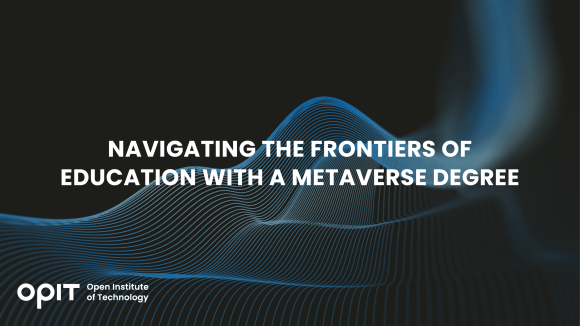

Interest in the potential of the metaverse is skyrocketing. This virtual landscape shows promising innovations in the way an average user interacts with tech. Using a blend of augmented reality (AR), virtual reality (VR), and blockchain technology, it promises to elevate user experience to new heights.
But it’s not just techies that are rejoicing. The metaverse will bring new marketing, brand-building, and sales opportunities for businesses of all sizes. And even more exciting – it promises to supercharge one of the globe’s fastest-growing entertainment sectors, gaming.
Those wanting to get in on the ground floor of the rapidly growing business and employment opportunities of the metaverse should carefully evaluate the advantages of a metaverse degree.
The metaverse is attracting some large investments from technology leaders, including Apple, Google, and Meta (previously known as Facebook). Even Microsoft has staked a claim to the immersive digital universes promised by Meta’s Metaverse.
With this much investment, it seems certain that the metaverse is here to stay.
The metaverse provides a new generation of business leaders and innovators a unique opportunity in this fast-evolving space. For these aspirant leaders, leveraging the opportunities of the metaverse will require a multidisciplinary degree. Those equipped with this specialized education will be in a prime position to enter the rapidly evolving metaverse-related employment market and adapt to the digital landscape’s changes.
Best On- and Off-Line Metaverse Degrees
Citibank estimates that the pool of metaverse users could top 5 billion by 2030 and that by then, metaverse business may be worth around $13 trillion.
The potentially explosive growth of metaverse career opportunities means that choosing the right provider of on or offline degree courses is essential. Given increasing demand, it is no surprise that some of the most respected technology-focused higher education institutions are providing some cutting-edge options for advanced study. These institutions embrace a multidisciplinary approach to the intersection of technology, business, and creativity.
Here are the five best metaverse degrees currently available:
Carnegie Mellon University – The Master of Human-Computer Interaction (MHCI) Program
This three-semester program consists of core courses such as the Capstone course – a seven-month R&D team project with an external industry client. The offering from Carnegie-Mellon claims to be the first program dedicated to preparing innovators and professionals for a career in human-computer interaction, user experience design, and user-focused research.
The University of Washington – MSc in Human-Centered Design and Engineering (HCDE)
The University of Washington MSC is a flexible course that offers a part-time or full-time degree. The program’s core courses include Theoretical Foundations of Human-Centered Design & Engineering, Navigating Design in Organizational Contexts, Visual Communication, and User-Centered Design.
University of Queensland – Master of Interaction Design
The University of Queensland’s course takes two years to complete, one of the lengthiest on this list. It incorporates core courses such as Design Thinking, Digital Prototyping, Human-Computer Interaction, and Social and Mobile Computing. Rather than focusing on the technology that will power the metaverse, this master’s degree focuses on how users interact with virtual environments. Those who qualify will become Interaction Designers, creating user-friendly and accessible digital products.
UCL (London, England) – The Human-Computer Interaction MSc
The UCL 12-month degree program is focused on sharpening their students’ real-world skills, with courses such as Interaction Design, Interaction Science, and the MSc HCI Project. This interdisciplinary MSc is centered on practical and professional skills related to the design and use of computer and mobile technology, with a concentration on interface usability.
University of Southern California (USC) – Master of Fine Arts in Interactive Media
As the lengthiest program on this list at three years, the USC degree features core courses such as Experiments in Interactivity, Design for Interactive Media Units, Survey of Interactive Media, Experiments in Interactivity, and Interactive Design and Production. The master’s program at USC prepares students for careers in the fast-growing field of interactive entertainment. It is suitable for those who do not have advanced computer capabilities and are unfamiliar with computer-based scripting. However, knowledge of computer-based authoring and production techniques will be useful.
OPIT’s Revolutionary Approach to Metaverse Education
Future-proof your qualification with an online Bachelor of Science (BSc) in Modern Computer Science from the Open Institute of Technology (OPIT). OPIT’s metaverse degree is the key to understanding and leveraging the latest developments in the field of interactive technology.
The elective choices offered by OPIT also allow students to master various metaverse-related competencies and tailor their degrees to suit their anticipated career path. Here are two examples of popular classes students are taking right now:
Specialization in Leadership and Business Development for the Metaverse
For those professionals who want to play a pivotal role in leading the metaverse revolution, this elective is a must. It examines how the metaverse is poised to disrupt existing business models through innovative digital asset management in a virtual environment. The course also examines the commercial applications of metaverse technology and how the metaverse leaders of tomorrow will use practical skills with real-world applicability to usher in a new wave of immersive opportunities.
Diving Into Project Methodology and Visual Communication
Electives such as “Project Methodology and Visual Communication” will equip the aspirant metaverse professional with the project management skills to master the virtual worlds of gaming and Meta’s Metaverse itself. Students will master topics such as agile project management, effective visual storytelling in virtual realities, and UI/UX design principles for immersive environments.
Why Choose OPIT for Your Metaverse Education?
Only those educational institutions that grasp the revolutionary nature of the metaverse can equip professionals with the skills and qualifications they require to become Masters of the Metaverse.
OPIT is fully accredited under the European Qualification Framework and the MFHEA (Malta Further and Higher Education Authority). It’s committed to providing the metaverse leadership of tomorrow with the skills they need to dominate the metaverse market.
Many institutions of higher learning offer foundational courses that will equip professionals with the skills required for a metaverse-focused career. OPIT is different because it provides students with real-world skills that can be leveraged from the day they obtain their degree. The theoretical underpinnings of these skills are delivered by recognized industry experts and innovators, providing students with insights that make a real difference in their chosen careers.
Dive Into the Metaverse With the Right Degree
The metaverse may be made of pixels, but it is real – and it’s here. The rise of the metaverse, a fast-evolving platform at the intersection of the digital and physical world, is set to entwine every aspect of our offline identity with a digital existence. But to enter this exciting field, you need the right degree.
A metaverse degree providing practical, real-world skills is required to dominate this ever-evolving digital space. An affordable, fast-track degree from OPIT will provide you with a comprehensive foundation of skills, theoretical and applicative, and marketable, to place you exactly where you need to be – at the forefront of this exhilarating frontier. Get ready to harness the potential of virtual realms with a metaverse degree from OPIT.
Have questions?
Visit our FAQ page or get in touch with us!
Write us at +39 335 576 0263
Get in touch at hello@opit.com
Talk to one of our Study Advisors
We are international
We can speak in:




